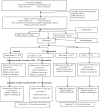Effectiveness of oral health education intervention among 12-15-year-old school children in Dharan, Nepal: a randomized controlled trial
- PMID: 34649553
- PMCID: PMC8515708
- DOI: 10.1186/s12903-021-01877-6
Effectiveness of oral health education intervention among 12-15-year-old school children in Dharan, Nepal: a randomized controlled trial
Abstract
Background: School-aged adolescents are in particular need of preventive program to ensure positive long-term oral health and hygiene. The objective of this study was to assess the effectiveness of an oral health education (OHE) intervention on oral hygiene knowledge, attitude and practices (KAP), plaque control and gingival health among 12-15 years old school children in Dharan sub-metropolitan city, Nepal.
Methods: A randomized controlled trial was conducted with parallel study groups, comprising 12-15-year-old school children, 120 in each group. OHE was given to the experimental group at baseline, third and sixth months and to the control group after completion of the study. Interview of the participants were done using a 23-item questionnaire for assessment of oral hygiene KAP. For each question, correct answer was scored as 1 and wrong answer was scored zero. An overall composite score was then created, by adding the individual scores. Oral examination was done using mouth mirror and WHO probe to record Turesky-Gilmore-Glickman modification of the Quigley-Hein plaque index, Gingival index and Dentition status and treatment needs. Analysis was done using chi-square test for categorical data and independent t test, Mann-Whitney U test, repeated measures ANOVA and post hoc Tukey's test for quantitative data. The level of significance was set at P < 0.05.
Results: There was 54.58% improvement in overall oral hygiene KAP in experimental group (P = 0.001) whereas no improvement was seen in control group at the end of the study. The mean plaque score was improved by 57.67% (P = 0.001) in experimental group in comparison to 4.56% in control group. Gingival index was improved by 49.90% (P = 0.001) in experimental group in comparison to 0.7% in control group. Caries experience was increased in both groups but no significant difference was seen.
Conclusions: The study concluded that oral health education was effective in improving oral hygiene KAP, plaque control and gingival health. Trial registration The trial was retrospectively registered with Clinical Trial Registry India (CTRI) with identifier no. CTRI/2018/05/013985, registered on 05/21/2018. ( http://www.ctri.nic.in/Clinicaltrials/pdf_generate.php?trialid=23651&EncHid=&modid=&compid=%27,%2723651det%27 ). Institutional Review Committee, B. P. Koirala Institute of Health Sciences (BPKIHS), Dharan, Nepal provided the ethical approval (Ref. No.: 292/074/075-IRC).
Keywords: Effectiveness; Oral health education; School children.
© 2021. The Author(s).
Conflict of interest statement
The authors declare that they have no competing interest.
Figures
References
-
- World Health Organization. Dental health education: report of a WHO Expert Committee [meeting held in Geneva from 2 to 8 December 1969]. World Health Organization; 1970. http://apps.who.int/iris/bitstream/10665/38209/1/WHO_TRS_449.pdf. Accessed 4 Dec 2016.
-
- World Health Organization. Strategy for oral health in South-East Asia, 2013–2020. World Health Organization Regional Office for South-East Asia; 2013. http://origin.searo.who.int/nepal/mediacentre/2013_strategy_for_oral_hea.... Accessed 4 Dec 2016.
-
- Bica I, Cunha M, Reis M, Costa P, Costa J, Albuquerque C. Educational intervention for oral health. Procedia Soc Behav Sci. 2015;171:613–619. doi: 10.1016/j.sbspro.2015.01.168. - DOI
-
- WHO . WHO information series on school health, Doc 11: Oral health promotion through schools. World Health Organization; 2003. p. 69.
Publication types
MeSH terms
LinkOut - more resources
Full Text Sources


